
Interested in improving diversity in AI, or in tech in general? I have done a bunch of research on this and have some advice 1/
https://twitter.com/NandoDF/status/1341699449861627913
First, what doesn’t work: shallow, showy diversity efforts (even if they are well-intentioned) aren’t just ineffective, they actively cause harm.
Spend time thinking through your strategy & making sure you can back it up 2/
medium.com/tech-diversity…
Spend time thinking through your strategy & making sure you can back it up 2/
medium.com/tech-diversity…
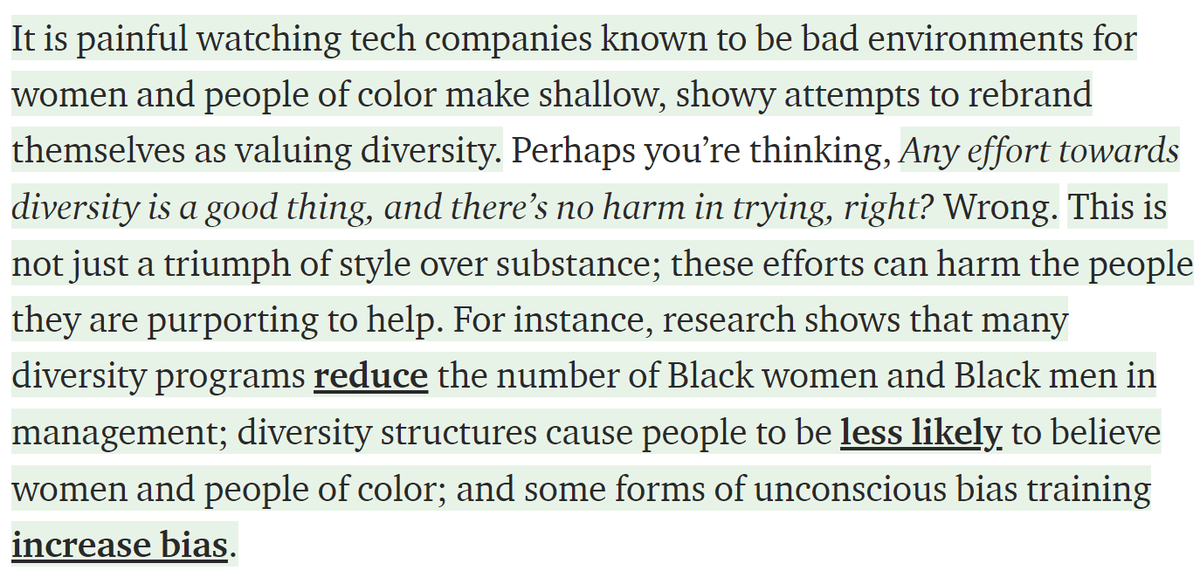
For example, if you start a “women & allies” email list and then fire a Black woman for being honest on it, it probably would have been better not to have the email list in the first place 3/
https://twitter.com/math_rachel/status/1334996228585652225
While teaching girls to code is nice, it doesn’t address the diversity problem we have now: 40% of women working in tech leave, often due to mistreatment, and 50% of Black & Latino grads with CS degrees can’t get hired at all 4/
Sadly, many folks love the idea of little girls coding, but don’t want to work with the adult women software engineers already at their company. There are similar dynamics around race. 5/
So what works? The #1 thing to do is to make sure that the Black women at your company actually have a fair shot at success. This also means you will have to get rid of the people who are actively sabotaging them 6/
medium.com/tech-diversity…
medium.com/tech-diversity…
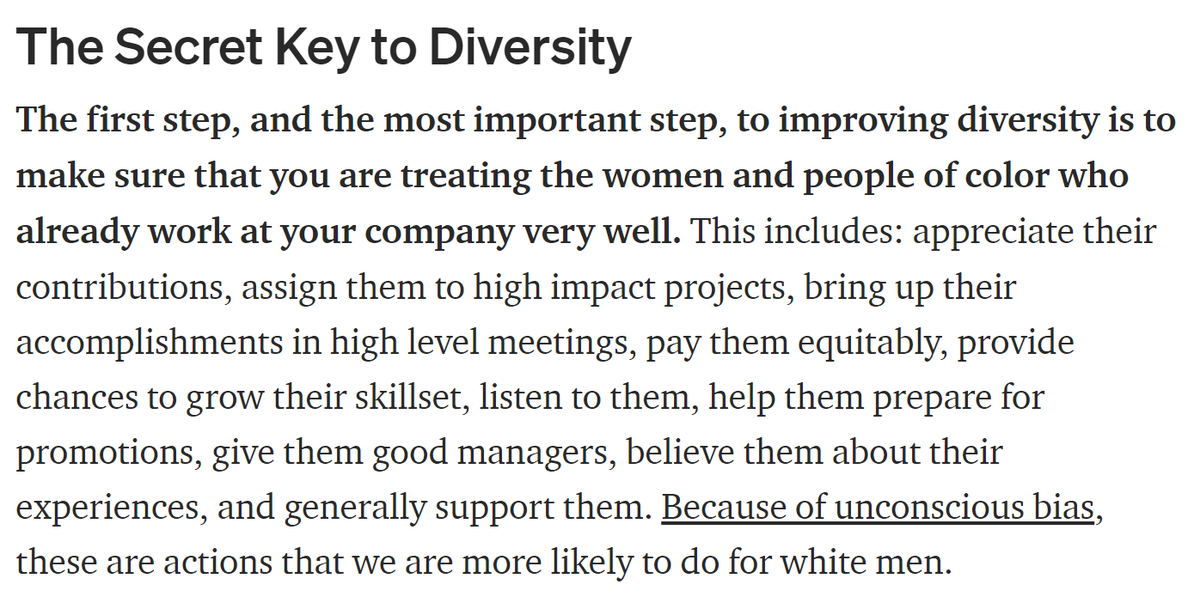
Without completing this first step of treating current employees well, even if you are able to hire more women and people of color, you won’t be able to retain them, and a bad reputation would make it harder for your company to attract talent in the future. 7/
When men are mentored, they receive public endorsement of their authority. When women are mentored, they are given advice on how they should change. Guess which of those is actually useful for getting promoted? 8/
medium.com/tech-diversity…
medium.com/tech-diversity…
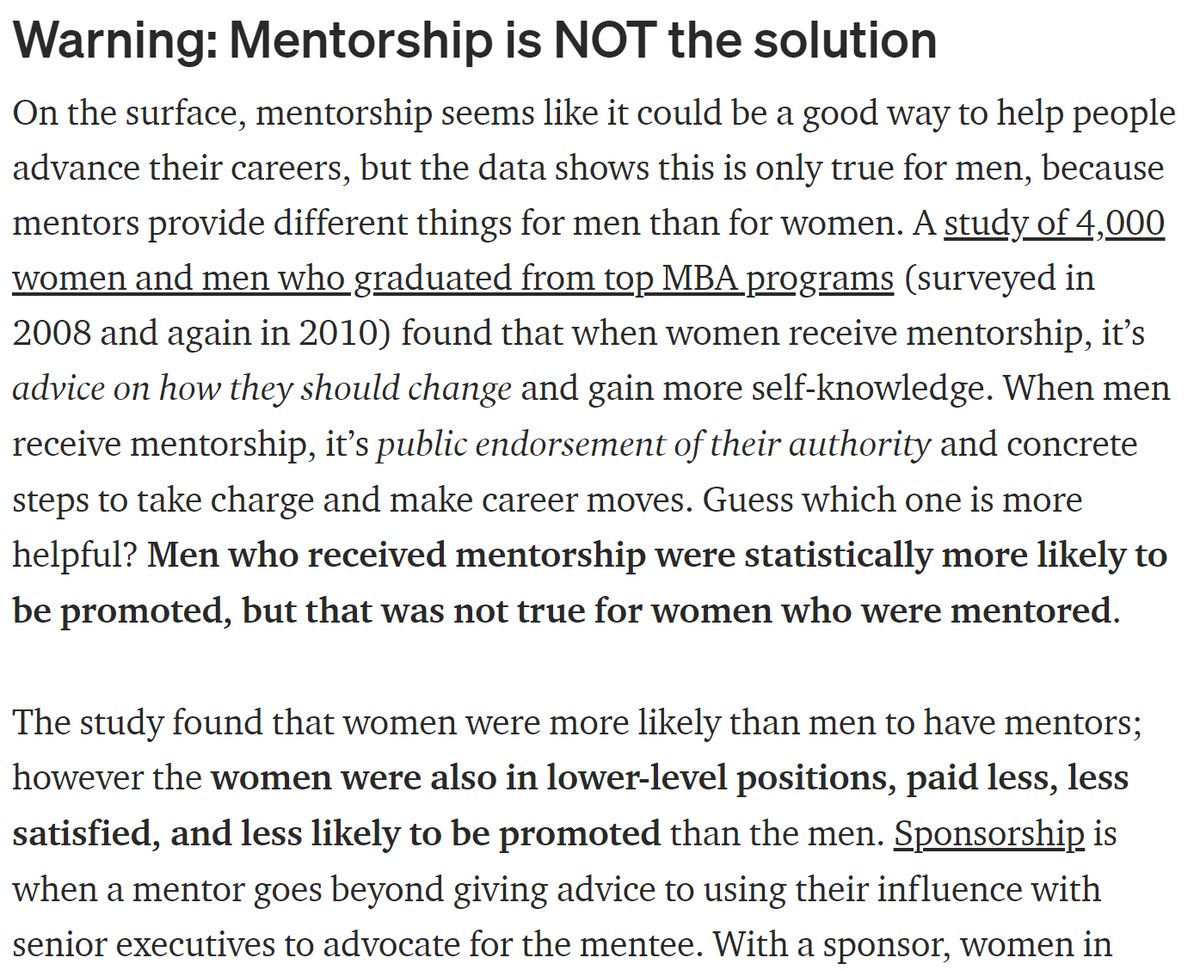
Action item: think of 1 person from an underrepresented group at your workplace, and champion their work: advocate for their ideas, praise them to leadership at your company, or recommend them for an interesting, high-impact work project. 9/
Train the managers at your org: don't underestimate the damage that an untrained & biased manager can cause 10/
medium.com/tech-diversity…
medium.com/tech-diversity…
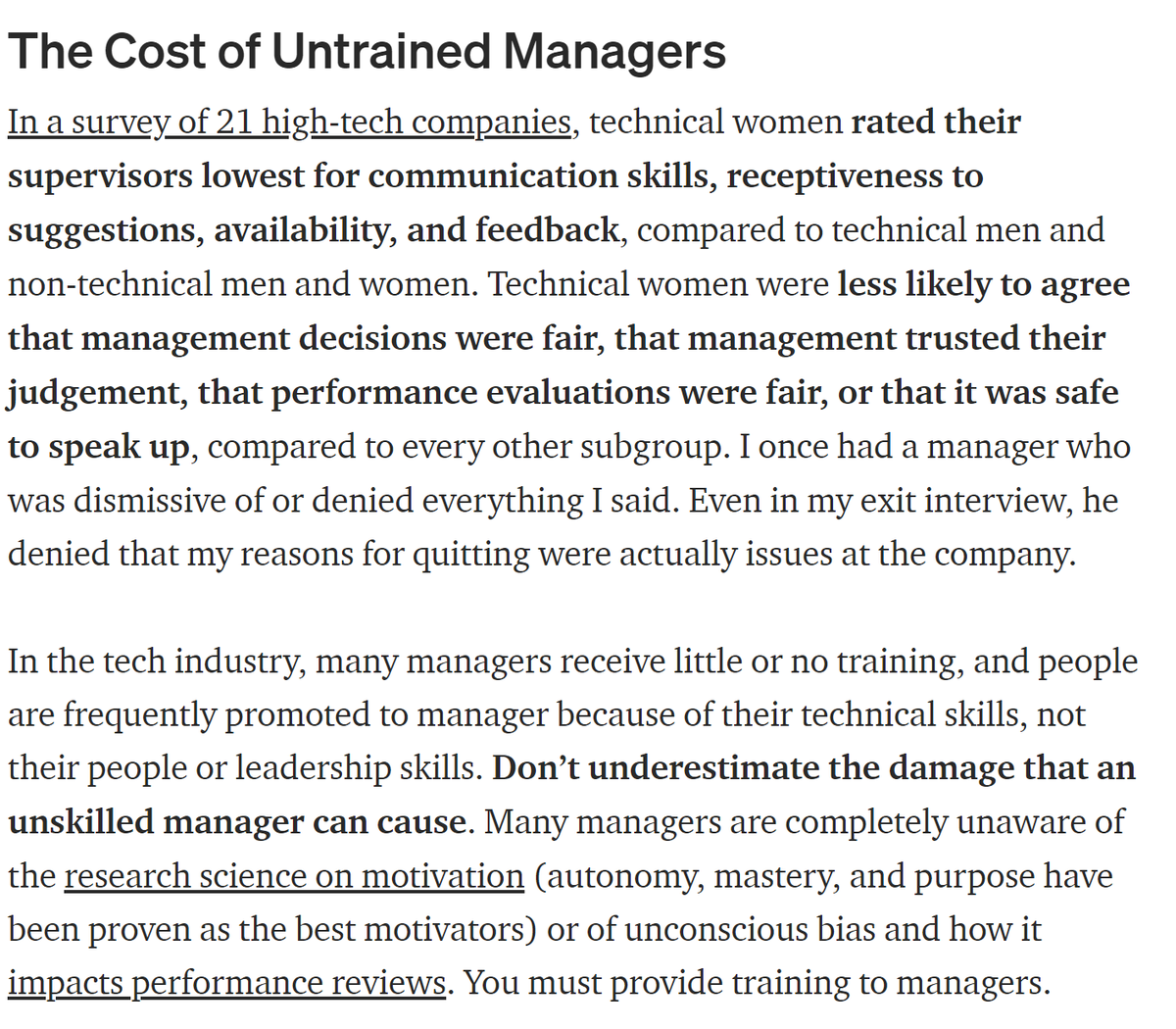
Men are more likely to receive actionable feedback in performance reviews, whereas women receive vague personality criticisms. Again, guess which is useful for getting promoted? 11/ 
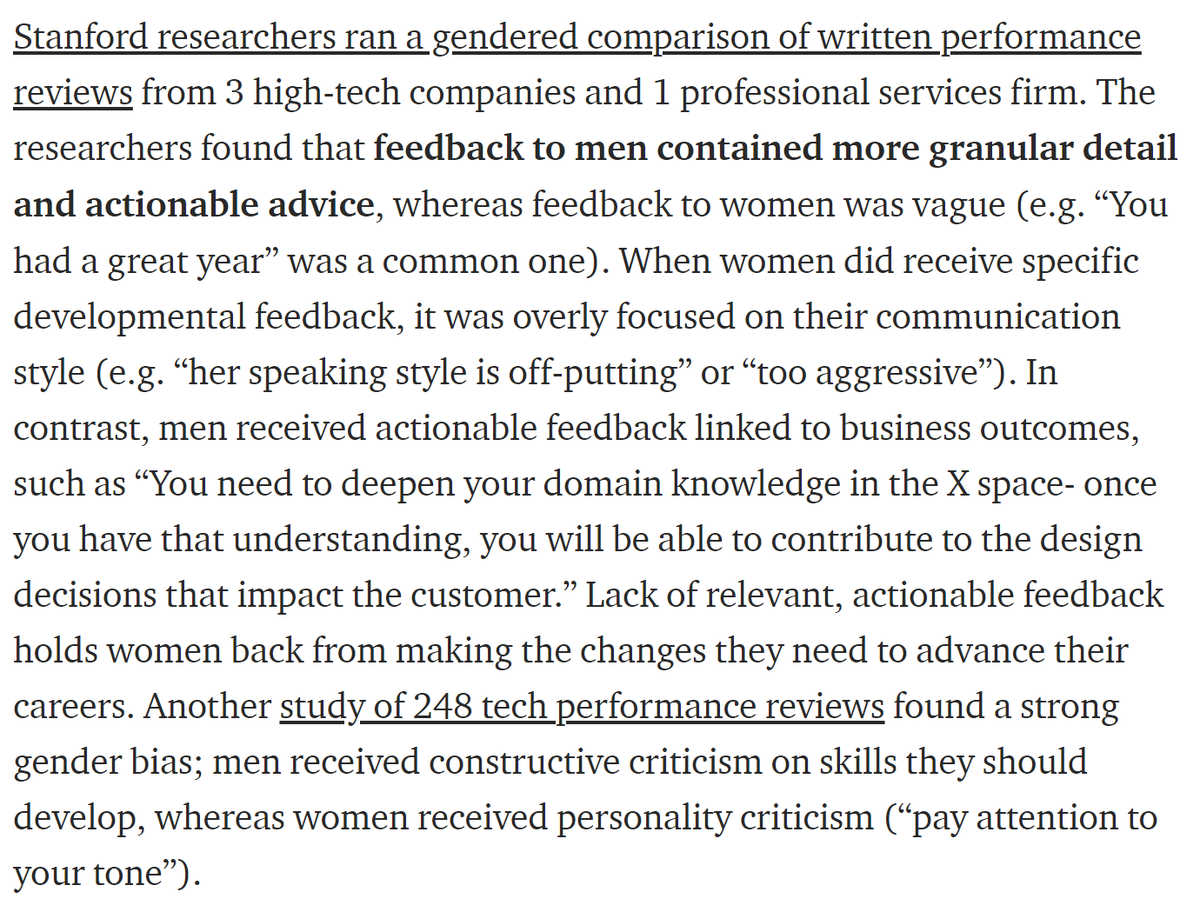
Research shows people like to hire people like them. You will need to overhaul your interview process: 12/
medium.com/@racheltho/how…
medium.com/@racheltho/how…
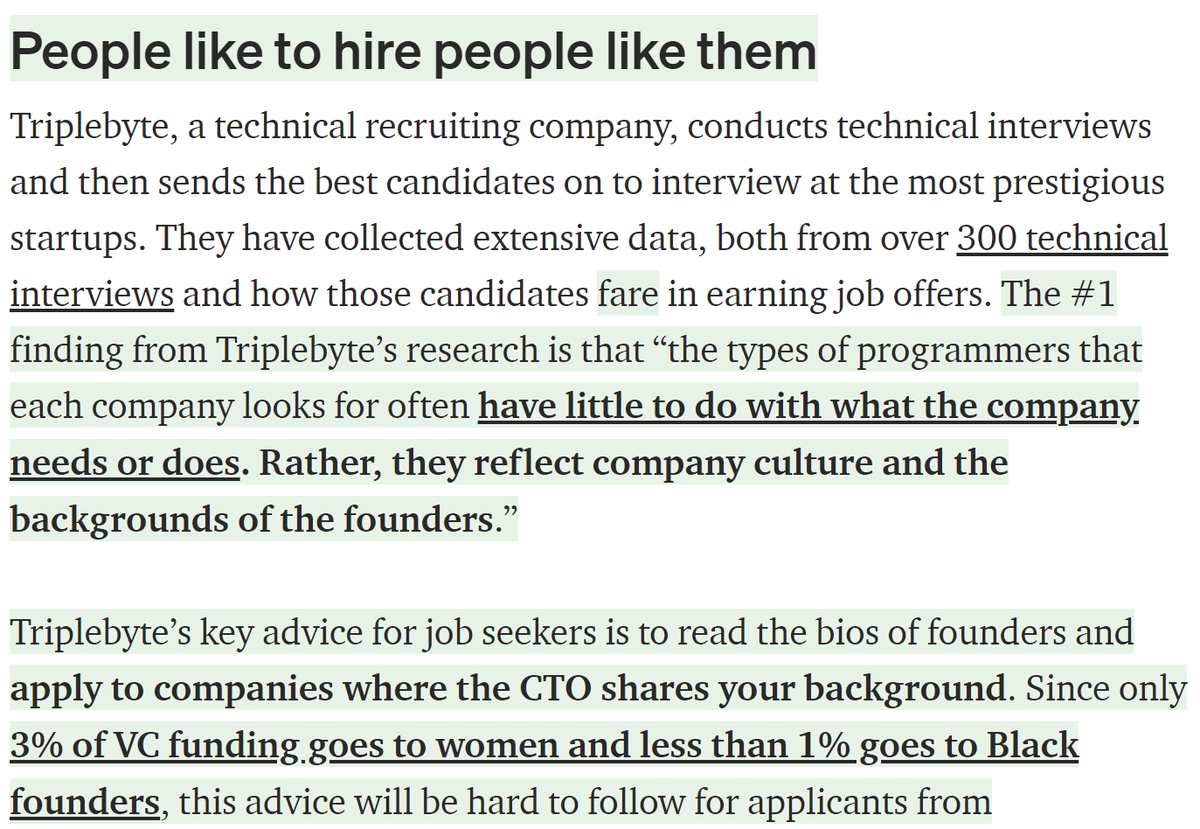
Also, read these tweets from a former Googler about how the interview process is set up so that one person can easily nix women and people of color. This is true at a lot of tech companies 13/
https://twitter.com/MarkCC/status/1341172594838544384
Another key obstacle to diversity is that HR & Legal are often big perpetrators of discrimination. I'm unsure of how we solve this (other than overhauling the legal system) 15/
https://twitter.com/timnitGebru/status/1340820962950979592
Companies don't want the legal liability of admitting there is any defect in their processes, which makes it nearly impossible for them to correct mistakes or improve 16/
https://twitter.com/math_rachel/status/1203897625096769536
Related: Harassers are often more litigious than their victims, so companies prioritize harassers 17/
https://twitter.com/math_rachel/status/1193726307286208512
To be clear: improving diversity in your org will require substantial changes (to your promotions process, performance reviews, hiring, & culture), not everyone will like those changes, and you will find out that folks you thought share your values actually don't 18/
When people expect that diversity can be improved with relatively "easy" gestures (eg: sponsor Grace Hopper Conference, tutor middle school girls, host a women's panel), they aren't prepared for the conflict that arises from anyone advocating for deeper, meaningful change. 19/
One example: Google had a comprehensive racial justice training that many found effective. Google cut the program so as to "avoid backlash from conservatives" & to avoid "claims by right-wing white employees about Google discriminating against them" 20/
nbcnews.com/news/us-news/c…
nbcnews.com/news/us-news/c…
I agree with @karlitaliliana's thread that we need a new set of laws to make workplace racial discrimination actually illegal. Even though I've been writing about what companies should do, this does not replace the huge need for regulation 21/
https://twitter.com/karlitaliliana/status/1332402211628806144?s=20
Here are a few articles I've written on the topics from this thread (all link to a ton of research) 22/
medium.com/tech-diversity…
medium.com/tech-diversity…
medium.com/tech-diversity…
medium.com/@racheltho/how…
medium.com/tech-diversity…
medium.com/tech-diversity…
medium.com/tech-diversity…
medium.com/tech-diversity…
medium.com/@racheltho/how…
medium.com/tech-diversity…
If you know folks who prefer video, here is a 9 minute video covering some of this material (the need to start at the *opposite* end of the pipeline: the toxic workplace, bias in performance review & mentorship, changing interview process) 23/
• • •
Missing some Tweet in this thread? You can try to
force a refresh







